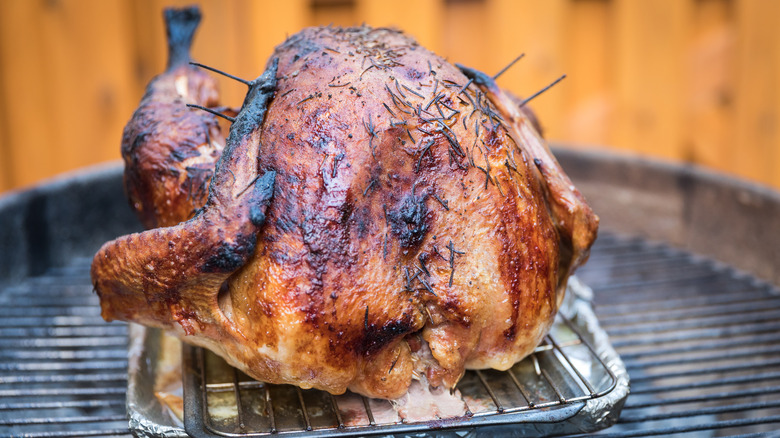On the Thanksgiving timeline, it’s important to start planning the meal early. As always, the star of the show is the turkey, and this year, why not switch things up and grill it for a delightful twist on tradition? Your Thanksgiving turkey will be a flavor-packed surprise, boasting an irresistible smoky, charred essence that will thrill your dinner guests.
If you do want to grill your turkey this year, be sure not to skip one vital step: oiling the bird. This seemingly simple task can make a world of difference in the outcome of your meal! Before placing your turkey on the grill, generously coat the entire bird with cooking oil. Firstly, the oil acts as a non-stick agent and keeps the meat from sticking to the grates. It’s very common for people to accidentally mangle their turkey by tugging on it once the non-oiled meat is stuck to the grates. Additionally, the oil serves as an insulator, guarding your bird from the direct heat of the grill and resulting in a more evenly cooked turkey.
This tip isn’t just about ease of cooking, though. Cooking oil enhances the aesthetic too. A well-oiled turkey will flaunt a glistening, caramelized skin that is sure to captivate every eye at the table. It’ll also help bring out the flavor in the meat and keep it moist and juicy.
Is it better to rub a turkey with oil or butter?

Many grilled turkey recipes will have you choose between lathering oil (typically olive oil), butter, or sometimes even ghee onto the bird before it goes onto the grates. The options all serve the same purpose for your turkey: preventing the meat from sticking and enhancing its appearance and flavor. The only thing you really need to consider is how each option imparts its unique taste and quality to your turkey and the gravy.
For instance, butter lends a rich and savory quality while elevating the crispiness of the skin. It serves as a fantastic canvas for incorporating herbs, spices, and seasonings into a compound butter, allowing you to deepen the flavor of the turkey. On the other hand, olive oil is a popular choice for its mild, fruity flavor that complements the turkey without overpowering it. Many people also appreciate oil’s ability to create uniquely crispy skin thanks to its low water content compared to butter. Furthermore, for those with lactose intolerance, olive oil is the safest option.
In any case, the decision on which fat to use ultimately comes down to your personal taste and what you have available. Both oil and butter, among other options, will serve as excellent coatings for your turkey. No need to fret over the right or wrong choice, just pick what you like the best!






